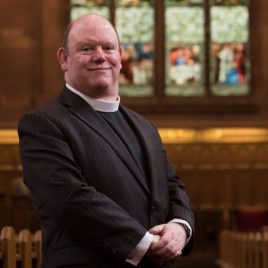
Guest Blogger: The Most Reverend Dr. Derek Browning
In his famous Sermons on the Sacraments, delivered at St Giles’ High Kirk, Edinburgh in 1589, Robert Bruce, a successor to John Knox was one of the most deeply spiritual and power ministers the Church of Scotland ever produced. He wrote:
“There is nothing in this world, or out of this world, more to be wished by everyone of you than to be conjoined with Jesus Christ…This heavenly and celestial conjunction is procured and brought about by two special means. It is brought about by means of the Word and preaching of the Gospel, and it is brought about by means of the Sacraments…The Word leads us to Christ by the ear; the Sacraments lead us to Christ by the eye…
In our current climate where gatherings of all sorts are prohibited how, from a Reformed perspective, is ‘communion’ to be experienced? Is the action entirely dependent on a gathering of the faithful ‘around the table’, the ultimate prerequisite? Might it be possible for us to take Jesus’ comment, “…where two or three are gathered in my name, there am I in the midst of them”, and apply this to communion practices? Many Reformed ministers will already practise something like this when they share home communion with the hospitalised or housebound. For some it might even be the case that at a home communion the sense of the spiritual is even greater without the drama and choreography of most of our church-based communion services. Are we going to take seriously the statement of the Apostles’ Creed that we do believe in the ‘communion of saints’, spiritually and eternally present? Or even more fundamentally the unshakeable hope spoken at the end of Matthew’s Gospel, “…and lo, I am with you always, to the close of the age.” The essential doctrine of Christian faith is incarnation, God with us. We are not alone; we are never alone. The most important word in the Bible is ‘with’.
For Christians of all persuasions, in these short but profound claims within our faith, the practicality and spirituality of Jesus shines out. Communion may be incarnational, caught up as it is in the continuous and continuing presence of Jesus, as well as representational in the spiritual reality of that presence.
In July 1969, during the first manned moon landing, Buzz Aldrin wanted the first meal on the Moon to be a communion meal. Tucked away in his personal belongings was a pouch for the historic voyage, with a Bible verse written on a slip of paper, a bread wafer, a small amount of wine and a tiny silver chalice. The Bible verse was John 15:5: “I am the vine, you are the branches. He who abides in me, and I in him, he it is that bears much fruit, for apart from me you can do nothing.”
Aldrin alone ate and drank, but few would deny that this was as ‘real’ a communion as any other. From our reformed tradition, Word and Sacrament were brought together, and therefore communion took place.
In the ideal world, of course, it is better that the sacramental meal is shared with sisters and brothers. But our world is often far from ideal. The spiritual communion is unaffected by the physical numbers present. Whether we are on our own, whether we witness communion over the internet and at the time of the meal, share together bread and wine we have brought ourselves, whether we are even on the Moon, surrounded by the communion of saints, in the continuous and continuing presence of Jesus Christ, when Word and Sacrament are brought together, there communion takes place.
 The Very Rev. Dr. Derek Browning is the Minister of Morningside Parish Church in Edinburgh Scotland and former Moderator of the General Assembly of the Church of Scotland.
The Very Rev. Dr. Derek Browning is the Minister of Morningside Parish Church in Edinburgh Scotland and former Moderator of the General Assembly of the Church of Scotland.

